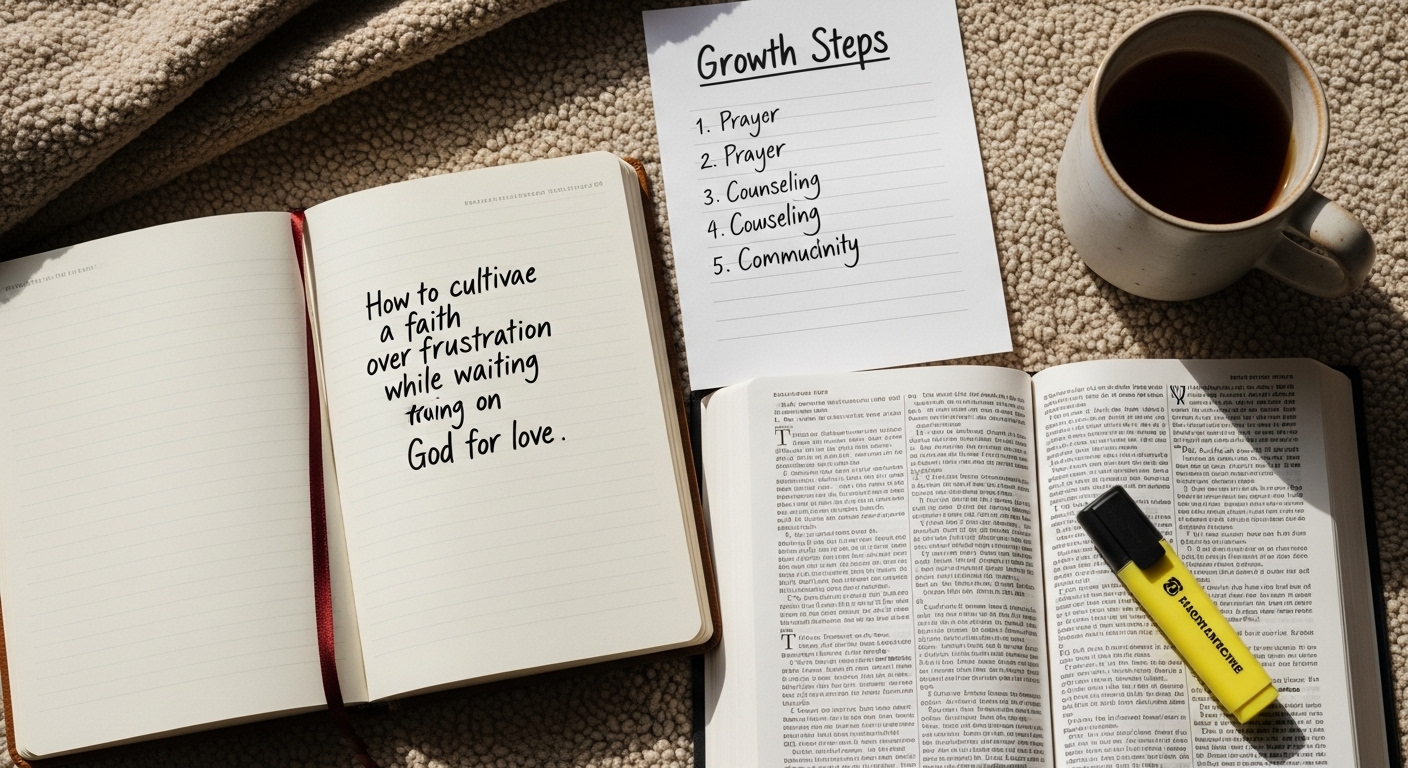Waiting On God’s Timing For Love: Faith Over Frustration

You’ve probably felt it: the clock ticks, the expectation builds, and the ache of wanting someone to walk beside you gets louder. When you’re waiting on God for love, the tension between hope and frustration can feel overwhelming. This article is written for you — the single Christian who wants to trust God’s plan but struggles with loneliness, impatience, and the pressure from the world around you. You’ll find encouragement, practical steps, and spiritual truth to carry you through this season with faith instead of frustration.
Why waiting hurts: the honest feelings you carry
Waiting on God for love is rarely tidy. You might feel a mix of hope, anxiety, envy, and shame. You see friends pairing off, social feeds showing engagement photos, and church announcements that remind you of an absence you didn’t ask for. That tension is real, and you should name it. When you refuse to gloss over the pain, you create space for genuine healing and spiritual growth.
You aren’t wrong to grieve what you don’t have yet. That grief doesn’t mean your faith is weak — it means you’re human. The goal isn’t to eliminate emotion but to learn how to hold it with faith, bringing it into prayer and community rather than letting it undermine your trust in God.
The difference between waiting and wasting time
There’s an important distinction between waiting and wasting time. Waiting on God for love means you’re intentionally aligning your heart with God’s timing. Wasting time looks like passivity, fear-based choices, or settling out of desperation. When you actively wait, you’re preparing — emotionally, spiritually, and practically — for the person God might bring into your life.
You’ll notice a different posture in active waiting: you’re growing, serving, pursuing holiness, and stewarding your emotions. That preparation matters because relationships flourish when both people enter them healthy and whole.
Reframe waiting as active trust
If waiting feels like a limbo, try reframing it as an active posture of trust. Trust is not idle; it involves choices. You choose to pray when it’s hard. You choose to set boundaries. You choose to invest in friendships and community. You choose to develop the character traits that will sustain a lifelong relationship.
Scripture calls you to patient trust. You can hold truth and emotion together: be honest about your longing while committing your timeline to God. That balance transforms waiting from a dark period into a season of refinement.
What Scripture says about waiting and God’s timing

The Bible is full of people who waited — and of promises that anchor you when your patience runs thin. Scriptures teach that God’s timing is purposeful, often different than your timetable, but never arbitrary.
Consider these promises that comfort and correct your heart. Let them shape how you pray and how you live while waiting on God for love.
- For the call to be patient, Psalm 27:14 tells you to “Wait for the LORD; be strong and take heart and wait for the LORD,” which frames waiting as an act of courage rather than defeat.
- The reality of seasons: Ecclesiastes 3:1 reminds you there is a time for everything — a season for waiting and a season for receiving.
- Guidance for trust: Proverbs 3:5-6 tells you to trust the Lord with all your heart and let Him direct your paths — a key posture when you’re waiting on God for love.
Every time you return to Scripture, you remind yourself that God’s timeline has a purpose beyond your immediate desire.
Stories of biblical waiting: real examples you can trust
One of the best things about Scripture is that it isn’t abstract. It shows real people who waited, wrestled, and were refined:
- Abraham and Sarah waited many years for the child God promised. Their story shows flawed faith that was refined over time; God fulfilled His promise in His way and in His timing.
- Joseph waited through betrayal, imprisonment, and delay before God elevated him to influence. His waiting shaped his character and prepared him for a ministry of leadership and reconciliation.
- Hannah prayed earnestly for a child and waited, pouring out her heart before God. Her wait moved her into deep dependence and eventual joy when God answered.
These stories reassure you that waiting is often part of a larger process in which God is forming character and increasing dependence on Him. They also show you that the outcome isn’t always immediate, but God’s faithfulness remains.
Promises that anchor you through waiting
When you feel discouraged, anchor your soul in promises like these:
- Romans 8:28 — God works for the good of those who love Him, even through seasons that feel confusing.
- Jeremiah 29:11 — God has plans for you that include hope and a future.
- Isaiah 40:31 — those who wait on the Lord renew their strength and mount up with wings like eagles.
You don’t have to manufacture hope. You can stand on these promises and let them reframe a waiting season into a time of strengthening.
How to cultivate faith over frustration while waiting on God for love

Waiting without a strategy often leads to bitterness. But you can cultivate faith through practical disciplines and heart work. These aren’t quick fixes, but they are steady, life-giving practices.
Commit to spiritual practices that pull your eyes off the clock and back to the Savior. They’ll form your character and shift your perspective, so you’re moving toward what matters most even as you wait.
Prayer that’s honest and hopeful
When you pray, be candid. Tell God about your loneliness, your fears, and your impatience. Don’t pretend your feelings are wrong; bring them into God’s presence. Honest prayer builds intimacy with God and invites Him to work in your heart.
Also, practice prayers of surrender: “Lord, I want love, but I want Yours more. Shape me for what’s best.” That posture releases you from grasping at outcomes and helps you trust His timing.
- Use Scripture in your prayers — pray Psalm 27:14 back to God when your waiting wears thin.
- Pray for holiness and for the ability to love well, not merely to be loved.
Aligning your heart: identity in Christ
Waiting on God for love becomes easier when your identity is rooted in Christ rather than in relationship status. The gospel declares your worth and belonging in Jesus. When you internalize that, loneliness shifts from an identity crisis to a felt lack that points you to deeper spiritual realities.
Work on spiritual disciplines that reinforce your identity: Bible reading, worship, confession, and serving others. As you grow in Christlikeness, you’ll attract healthier relationships and be better prepared when God brings someone into your life.
Practical steps for growth and preparation
Active waiting looks like concrete steps:
- Invest in friendships and mentoring relationships that encourage your faith.
- Pursue therapy or counseling if you have unresolved trauma or patterns that undermine future relationships.
- Learn practical relationship skills: communication, conflict resolution, and emotional regulation.
- Serve in ministries or community work to channel your longing into purpose.
These steps are not a checklist that guarantees a relationship, but they prepare you emotionally and spiritually. You’ll be healthier, more resilient, and ready for the right person when God’s timing arrives.
Dealing with doubt, fear, and comparison
Doubt will sneak in. Fear will whisper worst-case scenarios. Comparison will make your single season feel abnormal. These are spiritual and emotional battles you can learn to fight.
When doubt comes, bring it to God. When fear threatens to paralyze you, name it and ask God for courage. When comparison creeps in, practice gratitude and remember that social media isn’t the full picture.
When God seems silent: how to interpret spiritual silence
Silence from God doesn’t mean absence. Often, God’s silence is a refining silence — a place where He allows you to grow in faith without giving every answer. He may be cultivating humility, dependence, and a heart aligned with His desires.
Scripture calls you to hope when everything seems quiet. Hebrews 11:1 defines faith as confidence in what we hope for and assurance about what we do not see. This is the posture you’re invited to adopt when waiting on God for love.
When patience feels lost: lean on community and professional help
You don’t have to carry this alone. The Christian community can lift you, pray with you, and give perspective. Trusted friends and mentors can remind you of God’s faithfulness when you forget.
If loneliness or anxiety becomes overwhelming, consider counseling. Mental health care is a wise, God-honoring resource that helps you process emotions and build healthy relational patterns.
Dating wisely when the time comes

When God’s timing moves you into dating, you want to step forward with wisdom, not desperation. You can date with intentionality, clarity about your values, and openness to God’s direction.
This isn’t about rigid rules; it’s about discerning the person God is calling you toward and ensuring that the relationship promotes godliness, mutual respect, and spiritual growth.
Red flags and green flags for Christian dating
Knowing what to look for helps you avoid settling or repeating unhealthy patterns. Green flags include spiritual leadership (not perfection), emotional maturity, respect for boundaries, and alignment with core values. Red flags include avoidance of accountability, controlling behavior, or unresolved patterns that harm relationships.
Listen to godly counsel and observe character over time. Chemistry is important, but character is the long game.
Pray, ask, and discern together
If you meet someone who might be “the one,” pray together. Ask God for clarity and humility. Seek discernment through Scripture, community, and counsel. Dating with spiritual intentionality reduces the pressure to rush and helps you build a relationship centered on Christ.
Stories and testimony: hope-filled examples
Hearing others’ testimonies can be deeply encouraging when you’re waiting. Maybe you know someone who waited years, focused on growth, and later found a partner who complemented their strengths and supported their walk with God. Or maybe someone experienced seasons of wrong relationships before God brought a steady, sanctifying love.
These stories are not promises or formulas, but they are reminders that God often uses seasons of waiting to prepare you for deeper companionship and ministry. When you read or hear these testimonies, let them reassure you that waiting can be fruitful.
Holding hope with realism — balancing faith and action
Holding hope doesn’t mean ignoring practical realities. You can be both hopeful and wise. Hope is forward-looking, and action is present-focused. The two together keep you healthy: hope fuels patience, and action creates readiness.
Don’t confuse optimism with passivity. Waiting on God for love invites you to be spiritually active: pursue holiness, engage community, and live a purposeful life. At the same time, keep realistic expectations and boundaries so you don’t settle out of fear or societal pressure.
Trusting God’s timing without passivity
A helpful metaphor: think of waiting as gardening rather than carrying a ticking bomb. Gardeners work — they plant, water, prune, and protect — and they trust that growth will come in its season. You can cultivate your life in meaningful ways while trusting God’s timing for the harvest.
Be careful of two extremes: either doing nothing and expecting miracles, or manipulating people and circumstances to force an outcome. Biblical waiting is neither; it’s faithful stewardship of your heart and life.
Practical habits to practice weekly and monthly
Create rhythms that keep you anchored. Weekly, spend time in worship, Scripture, and fellowship. Monthly, evaluate your emotional health: are you moving toward growth or stalling? Are you carrying bitterness? Are you open to feedback?
These practical habits aren’t burdensome tasks; they’re life-giving practices that prepare you for a healthy relationship and deepen your intimacy with Christ.
What to do when you make mistakes
You will make mistakes — that’s part of being human. Maybe you rushed into the wrong relationship, or you responded out of fear. When that happens, don’t define yourself by mistakes. Confess, repent, and learn. Let God’s grace do restorative work in you, and ask for God-honoring accountability to help you grow beyond old patterns.
Remember 1 Corinthians 13:4-7 — love is patient, kind, and not self-seeking. Use these traits as a moral compass when you reflect on your choices and determine next steps.
When waiting becomes worship
One of the most beautiful transformations is when waiting becomes a form of worship. You offer your longing to God, trusting Him with the outcome and using the season to adore Him more deeply. Waiting then ceases to be merely an absence and becomes a sacred space where your faith grows.
This is not a spiritualized excuse to ignore pain — it’s a mature posture that invites God to do refining work. Worshipful waiting looks like gratitude in the small things, perseverance in prayer, and service to others, even when your heart hurts.
Tools to keep in your spiritual toolbox
- Scripture memorization: store verses like Philippians 4:6-7 and Romans 8:28 to call on during stress.
- Prayer partners: identify 1–2 people who will speak truth and pray for you consistently.
- Journaling: track prayers, progress, and patterns so you can see growth over time.
- Counseling: professional help is a tool, not a failure.
These resources help you steward your waiting season well and reduce the likelihood that frustration will take root.
Practical prayers to pray while waiting on God for love
You don’t need elaborate words. Honest and simple prayers connect you to God:
- “Lord, I want to trust You more than I want a timeline. Teach me to wait well.”
- “God, shape my heart to love like You. Prepare me for the person You have for me.”
- “Father, heal my past hurts so I can love freely. Bring courageous people into my life to help me grow.”
Keep praying in both lament and praise. Your prayers move you toward trust even when answers are slow.
Encouragement from the fruit of the Spirit
As you wait, ask God to cultivate the fruit of the Spirit in you: love, joy, peace, patience, kindness, goodness, faithfulness, gentleness, and self-control (Galatians 5:22-23). These traits will make you a better partner, friend, and follower of Jesus. They matter more than any relationship title.
When patience grows not as an empty endurance but as a Spirit-produced fruit, waiting becomes less about inactivity and more about becoming.
Final encouragement and takeaway
Waiting on God for love is not an easy or passive process; it’s a faithful, active response to God’s love. You are invited to trust Him, grow in character, steward your emotions, and prepare practically for the relationship God may bring. Your singleness is not a problem to fix but a season to steward. God is at work even when you don’t see the immediate evidence.
Remember to anchor yourself in Scripture, engage trustworthy community, and pursue personal growth. Let your waiting be shaped by prayerful surrender rather than frantic striving. God’s timing is perfect, and your faithfulness in this season matters deeply.

Explore More
For further reading and encouragement, check out these posts:
👉 7 Bible Verses About Faith in Hard Times
👉 Job’s Faith: What We Can Learn From His Trials
👉 How To Trust God When Everything Falls Apart
👉 Why God Allows Suffering – A Biblical Perspective
👉 Faith Over Fear: How To Stand Strong In Uncertain Seasons
👉 How To Encourage Someone Struggling With Their Faith
👉 5 Prayers for Strength When You’re Feeling Weak

📘 Jesus and the Woman Caught in Adultery – Grace and Mercy Over Judgement
A powerful retelling of John 8:1-11. This book brings to life the depth of forgiveness, mercy, and God’s unwavering love.
👉 Check it now on Amazon 🛒💥
🔥 “Every great message deserves a home online.” 🌍💬🏡
Don’t let your calling stay hidden. Start a Christian blog or website using Hostinger — with 99.9% uptime, a free domain, and SSL, your voice can shine for God’s glory anytime, anywhere.
💥 Begin today. 🛒 Try it RISK-FREE! ✅
✝️ “Your body is God’s temple — care for it with purpose.” 💪💖🏛️
Renew your energy and restore balance naturally. Mitolyn helps support a healthy metabolism, giving you the vitality to live out God’s calling with strength and confidence.
🔥 Unlock Your Metabolic Power! ⚡Burn More Calories & Feel Great With Mitolyn. 💪
👉 Start Today. 🚀 Check Price Now. 🛒💰
💰 As a ClickBank & Amazon Affiliate, I earn from qualifying purchases.
📖 Acknowledgment: All Bible verses referenced in this article were accessed via Bible Gateway (or Bible Hub).
🚀 Want to explore more? 👉 Dive into our new post on Why Jesus? and experience the 🔥 life-changing truth of the Gospel!





